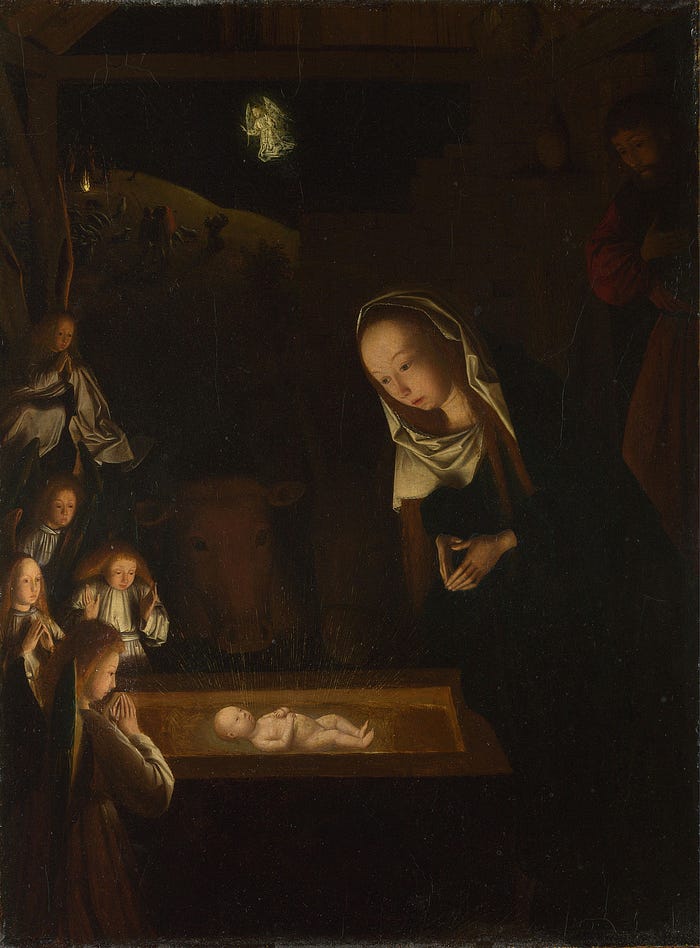Jesus Was Born in Bethlehem

The Roman emperor, Augustus (r. 27 BC - 14 AD), decreed that a census should be taken throughout the empire. (This was the first census taken when Quirinius was governor of Syria.) All returned to their own ancestral towns to register for this census. And because Joseph was a descendant of King David, he had to go to Bethlehem in Judea, David’s ancient home. He traveled there from the village of Nazareth in Galilee. He took with him Mary, to whom he was engaged, who was now expecting a child. And while they were there, the time came for her baby to be born. She gave birth to her firstborn son (c. 6-4 BC). She wrapped him snugly in strips of cloth and laid him in a manger, because there was no lodging available for them.
Jesus was born in Bethlehem during the reign of King Herod.
About that time some wise men from eastern lands arrived in Jerusalem, asking, “Where is the newborn king of the Jews? We saw his star as it rose, and we have come to worship him.”
King Herod was deeply disturbed when he heard this, as was everyone in Jerusalem. He called a meeting of the leading priests and teachers of religious law and asked, “Where is the Messiah supposed to be born?”
“In Bethlehem in Judea,” they said, “for this is what the prophet wrote: ‘And you, O Bethlehem in the land of Judah, are not least among the ruling cities of Judah, for a ruler will come from you who will be the shepherd for my people Israel.’”
Then Herod called for a private meeting with the wise men, and he learned from them the time when the star first appeared. Then he told them, “Go to Bethlehem and search carefully for the child. And when you find him, come back and tell me so that I can go and worship him, too!”
After this interview the wise men went their way. And the star they had seen in the east guided them to Bethlehem. It went ahead of them and stopped over the place where the child was.
When they saw the star, they were filled with joy! They entered the house and saw the child with his mother, Mary, and they bowed down and worshiped him. Then they opened their treasure chests and gave him gifts of gold, frankincense, and myrrh.
When it was time to leave, they returned to their own country by another route, for God had warned them in a dream not to return to Herod.
After the wise men were gone, an angel of the Lord appeared to Joseph in a dream. “Get up! Flee to Egypt with the child and his mother,” the angel said. “Stay there until I tell you to return, because Herod is going to search for the child to kill him.”
Eight days later, when the baby was circumcised, he was named Jesus, the name given him by the angel even before he was conceived. Then it was time for their purification offering, as required by the law of Moses after the birth of a child; so his parents took him to Jerusalem to present him to the Lord. At that time there was a man in Jerusalem named Simeon. He was righteous and devout and was eagerly waiting for the Messiah to come and rescue Israel, the Promised Land.
Simeon blessed them, and he said to Mary, the baby’s mother, “This child is destined to cause many in Israel to fall, and many others to rise. He has been sent as a sign from God, but many will oppose him. As a result, the deepest thoughts of many hearts will be revealed. And a sword will pierce your very soul.”
Present-day Bethlehem is a city in the West Bank located about six miles south of Jerusalem.
Bethlehem was a Canaanite settlement that dates back to around 3000 BC. Canaan and Egypt were neighbors in ancient times.
Canaan, the patriarch of the Canaanites, was the youngest of Ham's sons… Ham was the second son of Noah and the patriarch of the Hamites.
The sons of Ham were Cush, Mizraim, Put, and Canaan.
The Canaanite clans scattered and the borders of Canaan reached from Sidon toward Gerar as far as Gaza, and then toward Sodom, Gomorrah, Admah and Zeboyim, as far as Lasha.
Canaan’s sons were Sidon, the eldest and patriarch of the Sidonians, Heth (Hittites), Jebus (Jebusites), Emor (Amorites), and Girgash (Girgashites), Hiv (Hivites), Ark (Arkites), Sin (Sinites), Arvad (Arvadites), Zemar (Zemarites), and Hamath (Hamathites).
---
About the Author: Lawrence Jean-Louis is the founder of eBrand Me, a digital marketing agency offering marketing & consultative services to CPAs and tax professionals. She aspires to start a money management firm by 2030.
